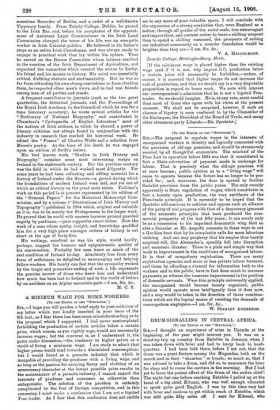A MINIMUM WAGE FOR HOME-WORKERS.
[To THN EDITOR or THB "SPIICTAITOR.1
SIR,—I hope you will pardon a brief reply to your criticism of my letter which you kindly inserted in your issue of the 8th inst., as I fear there has been some misunderstanding as to the proposal which I supported. I had never contemplated forbidding the production of certain articles below a certain price, which course, as you rightly urge, would not necessarily increase wages ; but the converse is, as I understand it, the point under discussion,—the tendency to higher prices as a result of fixing a minimum wage. I am ready to admit that higher prices would tend towards a diminished consumption ; but I would brand as a parasite industry that which is incapable of providing the producer with a living wage, and so long as the passion for securing finery and clothing of an unnecessary character at the lowest possible price results in the maintenance of a parasite industry, I cannot regard the interests of producer and consumer as otherwise than antagonistic. The solution of the problem is certainly complicated by the fear of foreign competition, and in this connexion I must make a confession that I am not a bigoted Free-trader. As I fear that this confession does not entitle me to any more of your valuable space, I will conclude with the expression of a strong conviction that, were England• as a nation, through all grades of the social scale, less extravagant and improvident, and content rather to leave a shilling unspent than to spend a shilling unearned, the prospects of setting our industrial community on a sounder foundation would be brighter than they are.—I am, Sir, &e., V. A. MA.LcoLmsow.
Leaside Cottage, Hertingfordbury, Herts.
[If the minimum wage is placed higher than the existing wage (and if it is not, why impose it P), production below. a certain price will necessarily be forbidden,—unless, of course, it is asserted that higher wages do not increase the cost of production, and that we should say is a very disputable proposition in regard to home work. We note with interest our correspondent's admission that he is not a bigoted Free- trader. So we should imagine. He is, at any rate, more candid than most of those who agree with his views at the present moment. We shall not be surprised, however, if such an absence of bigotry is soon confessed to by the Chancellor of the Exchequer, the President of the Board of Trade, and many other strenuous party Liberals.—En. Spectator.]






































 Previous page
Previous page